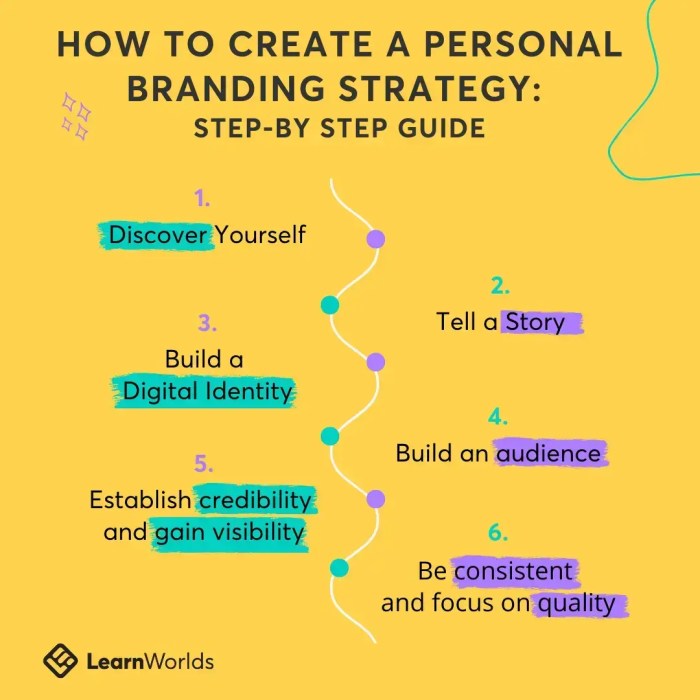Creating a Personal Branding Strategy sets the stage for crafting a powerful and authentic image that resonates with your audience, paving the way for success and recognition in a competitive landscape.
As we delve deeper, we will explore the essential components of a robust personal branding strategy and how to effectively establish a captivating online presence that leaves a lasting impact.
Importance of Personal Branding Strategy
In today’s highly competitive market, having a strong personal branding strategy is essential for standing out from the crowd and making a lasting impression on potential employers, clients, and business partners.
Examples of Successful Personal Branding Strategies
- One example of a successful personal branding strategy is that of Elon Musk, who has built a strong personal brand around innovation, leadership, and forward-thinking ideas. His personal brand has not only helped him in advancing his career but has also opened up various business opportunities for him.
- Oprah Winfrey is another individual who has effectively utilized personal branding to build a successful media empire. Her strong personal brand as an influential talk show host and philanthropist has allowed her to expand her career and business ventures.
Benefits of a Strong Personal Brand
- A strong personal brand can help in career advancement by making you more visible and memorable to potential employers and recruiters.
- It can also open up new business opportunities by attracting clients and partners who resonate with your personal brand values and image.
- Having a clear personal brand can differentiate you from competitors and showcase your unique skills, expertise, and personality, setting you apart in a crowded market.
Components of a Personal Branding Strategy

Building a strong personal branding strategy involves several key elements that help individuals establish a unique identity and connect with their target audience effectively. These components play a crucial role in shaping how one is perceived in the professional world and can ultimately impact career success.
Unique Value Proposition
One of the central components of a personal branding strategy is defining your unique value proposition. This is essentially what sets you apart from others in your field and highlights the specific skills, experiences, or qualities that make you valuable to your audience.
Target Audience
Identifying and understanding your target audience is essential for creating a successful personal brand. Knowing who you are trying to reach allows you to tailor your messaging and content to resonate with their needs, preferences, and interests.
Messaging
Your personal brand messaging should be consistent and aligned with your unique value proposition. It should clearly communicate who you are, what you stand for, and the value you bring to the table. Crafting a compelling message helps you connect with your audience on a deeper level.
Personal Brand Attributes
Defining your personal brand attributes involves identifying the key characteristics, values, and qualities that represent who you are as a professional. This includes your strengths, passions, goals, and overall personality traits that shape your brand identity.
Consistency Across Platforms
Maintaining consistency across different platforms is crucial for building a strong personal brand. Whether it’s your website, social media profiles, or networking events, ensuring that your messaging, tone, and visual elements are cohesive helps reinforce your brand identity and credibility.
Building an Online Presence

In today’s digital age, having a strong online presence is crucial for building your personal brand. With the right strategies, you can effectively showcase your skills and expertise to a wide audience. Here are some key tips for creating a professional online presence through social media platforms.
Utilize Social Media Platforms
- Create profiles on professional platforms like LinkedIn to highlight your professional accomplishments and connect with industry professionals.
- Use platforms like Twitter and Instagram to share industry insights, personal experiences, and engage with your audience on a more personal level.
- Ensure consistency in your branding across all platforms, including profile pictures, bios, and content style.
Role of Content Creation
Content creation plays a vital role in establishing a strong online personal brand. By regularly sharing valuable and relevant content, you can position yourself as an expert in your field and build credibility with your audience. Here’s how you can leverage content creation to enhance your online presence.
- Identify your target audience and tailor your content to meet their needs and interests.
- Create a content calendar to ensure consistent posting and maintain engagement with your audience.
- Utilize different formats such as blog posts, videos, infographics, and podcasts to diversify your content and reach a wider audience.
Engagement with Audience
Engaging with your audience effectively through online channels is essential for building a loyal following and establishing meaningful connections. Here are some strategies to help you engage with your audience and foster a strong online community.
- Respond promptly to comments, messages, and inquiries from your audience to show that you value their input and feedback.
- Host live Q&A sessions, webinars, or virtual events to interact with your audience in real-time and address their questions and concerns.
- Collaborate with influencers or industry experts to expand your reach and attract new followers who resonate with your personal brand.
Personal Branding Strategies for Different Industries: Creating A Personal Branding Strategy
In today’s diverse job market, it is crucial to tailor your personal branding strategy based on the specific industry you are targeting. Each industry has its own set of values, expectations, and norms, so it’s important to adapt your personal brand to align with these factors.
Creative Industry
In the creative industry, showcasing your unique talents, creativity, and originality is key. Personal branding strategies could include creating a visually appealing portfolio, engaging with other creatives on social media platforms, and attending industry events to network and showcase your work.
Corporate Industry
For the corporate world, professionalism, reliability, and leadership are highly valued. Personal branding strategies may involve highlighting your achievements, qualifications, and industry knowledge on platforms like LinkedIn, participating in industry-related discussions, and showcasing your ability to work well in a team.
Entrepreneurial Industry, Creating a Personal Branding Strategy
In the entrepreneurial field, showcasing your innovation, risk-taking ability, and passion for your business are crucial. Personal branding strategies could include creating a strong online presence through a professional website or blog, sharing your entrepreneurial journey on social media, and networking with other entrepreneurs to build partnerships and collaborations.
Examples of individuals who have successfully navigated personal branding in various industries include:
– Marie Forleo, a successful entrepreneur and business coach, who has built a strong personal brand through her online presence and inspirational content.
– Michael Beirut, a renowned graphic designer, who has established a personal brand based on his innovative design work and thought leadership in the creative industry.
– Sheryl Sandberg, the COO of Facebook, who has built a personal brand centered around her leadership skills, advocacy for women in the workplace, and philanthropic efforts.


